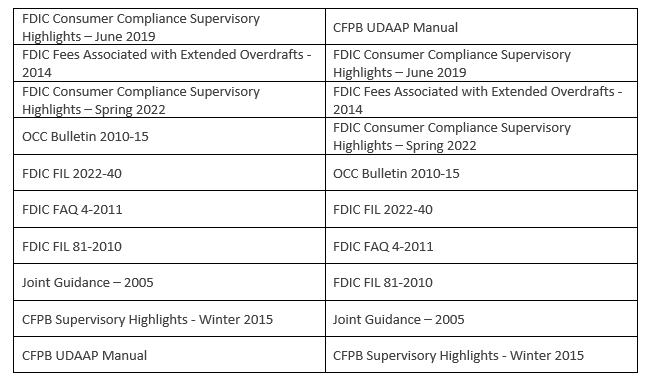Regulation E: What Everyone is Talking About

“If you are losing money, you are probably doing Reg E right.” That is a quote from a wise-Karen (aka me). Reg E is a very customer-centric regulation and that concept does not appear to be changing anytime soon.
Make sure to check out the news on the recent communication from the FDIC. The Financial Institution Letter (FIL-32-2023) published June 16, 2023, which updates prior issued FIL’s stating “current supervisory approach to not request an institution to conduct a lookback review absent a likelihood of substantial consumer harm.”
Trends Across the Country
We are seeing some changes made by financial institutions (FI) without regulation requirements driving the changes.
- FI’s are NOT charging overdrafts on:
- Any transactions.
- Debit card purchases.
- ATM withdrawals.
- Removal of the Continuous Overdraft fee or Extended Overdraft fees.
- Not charging any Non-Sufficient Funds (NSF) fees; fees when items are returned.
Some other popular changes we have seen on overdraft programs and assessments of fees are:
- Decreasing of Overdraft and NSF fees charged to customers.
- Decreasing the daily limit of fees assessed to customers or for those FIs that hadn’t implemented a limit adding a daily limit.
- New or increased “cushion” before charging fees.
- New or extended grace periods (days) or amounts before charging fees.
What to Consider Next for Overdrafts
Incorporation Overdraft Oversight into your Compliance Management Program. Further, consider taking and documenting a Risk Assessment approach to the overdraft program. Finally, what information is shared with senior management, or the board of directors related to overdrafts and what is the frequency of information shared forward?
- Creating and/or enhancing overdraft, refund activity and charge-offs related to negative balances:
- Top customers
- Volumes
- Trends
- Demographics
What do your customers understand about overdrafts? Assessment of your customer education at the time of opt-in if you have an Overdraft Program is imperative. Ensure your account opening personnel are not just having customers sign “another disclosure”. Some areas to consider educating your customers on are:
- Training on posting order of items.
- Ledger Balance vs. Available Balance.
- How to balance your checkbook.
- POS (Point of Sale)/Debit Cards: Authorized positive and posting negative.
- Cost of overdrafts.
If your FI has an Overdraft Program take another look at your program management, customer outreach for high usage/fee volume, and increase your training and education for customers on the costs of overdrafts and fees.
Please note that the beginning of this section was titled “what to consider”. Most of what is listed here is not required, some aspects are, but how you manage your program, communicate to senior management/board of directors and most importantly how customer overdrafts are managed rolls into your Compliance Management Program and also the oversight on UDAAP (Unfair, Deceptive, or Abusive Acts or Practices).
Another area that has been talked about in various publications and potential rule making is consideration from a Fair Lending perspective.
- Extension of credit
- Drawing an account negative is essentially creating a loan/credit.
- Use of models
- What parameters are set within the model to assist or make decisions? Are those rules ever overridden? Who has the authority to override? Are these alleviations from the model documented/tracked?
- Steering or targeting
- Having customers opt-in without providing appropriate education to help customers make an informed decision.
- Inconsistency
- Does your policy match your procedure and your practices?
- What oversight and reporting is done on refunds?
- Discriminatory Factors
- Understanding your FIs refunds, returns, volumes of overdrafts, etc. and if those share any characteristics or outline trends in protected classes.
The world of Reg E and overdrafts will be a constantly evolving one with potential changes on the horizon with a few proposed rules being discussed at various levels of legislation. Educate yourself, educate your team and educate management. Let us know how we can partner with you to support your program!
CLA has partnered with KlariVis to help FIs visualize data. KlariVis consumes data from a wide range of core and ancillary systems, turning it into intuitive, interactive data visualizations. KlariVis Demo Request
Great resources and some “light” reading:

Karen focuses on regulatory compliance, BSA, compliance management systems and special projects, such as compliance risk assessments and BSA assessments.

Comments are closed.